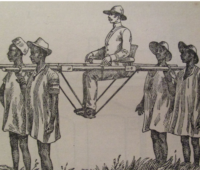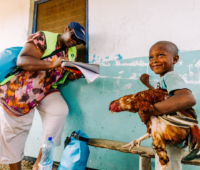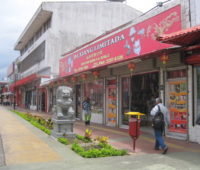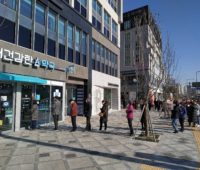This article explores the impact of Covid-19, including the government’s response to the pandemic, on military counterinsurgency operations in northeast Nigeria. Prior to the pandemic, Nigeria’s counterinsurgency operation in the region had not been impressive despite a budgetary expenditure of over NGN 4 trillion allocated to the defense sector since 2009. The successes of the operations have been short lived despite the government’s claims that Boko Haram fighters have been “technically defeated.” The floundering counterinsurgency operations before and during the spread of Covid-19 to Nigeria could be attributed to a number of factors. These range from poor strategic planning and tactics, lack of weapons and logistics supplies, and delays in the payment of salaries. Others include poor welfare packages, allegations of corruption, and poor coordination of the security agencies involved in planning and executing military operations.
Starting with SSRC president Alondra Nelson’s reflections on “Society after Pandemic,” this series of essays explores the human, social, political, and ethical dimensions of Covid-19. These pieces call attention to how social research can shed light on the short- and long-term effects of the pandemic and what can be done to improve responses, both now and in the future.
The publication of this series would not be possible if not for the help of the following SSRC staff:
Juni Ahari, communications and editorial assistant.
Cole Edick, program associate, Anxieties of Democracy and Media & Democracy programs.
Carrie Hamilton, program assistant, Social Data Initiative and Media & Democracy program.
Saarah Jappie, program officer, Transregional Collaboratory on the Indian Ocean.
Michelle Lee, program assistant, International Dissertation Research Fellowship.
Line Sidonie Talla Mafotsing, communications and editorial assistant, African Peacebuilding Network and Next Generation Social Sciences in Africa.
Daniella Sarnoff, program director, International Dissertation Research Fellowship.
Catherine Weddig, program assistant, Social Data Initiative and Media & Democracy program.
Themes
Essays


The Pandemic and the Production of Solidarity
by Margaret WeirIn this contribution to our “Covid-19 and the Social Sciences” series, Margaret Weir explores how social solidarity manifests across differing contexts. She makes three points of contrast between the United Kingdom and the United States: pre-existing healthcare institutions, economic stimulus strategies, and public leadership on racial and ethnic differences. Weir argues that these three areas explain why social solidarity has been maintained in the United Kingdom compared to the United States despite similar national attempts to confront the Covid-19 pandemic.

Disturbing the Aesthetics of Power: Why Covid-19 Is Not an “Event” for Fieldwork-based Social Scientists
by Aymar Nyenyezi BisokaAymar Nyenyezi Bisoka, writing for our “Covid-19 and the Social Sciences” series, queries why Covid-19 has not become an “event” for Western social researchers: an accident that radically reverses the normal order of things. Instead, he demonstrates that the Black bodies of research assistants continue to carry the weight of a colonial system of knowledge production, rendering them vulnerable to dangerous conditions. How, Bisoka asks, might a decolonizing response change research practice—and how have African artistic productions helped to map this terrain?

Elections and Protests in Latin America: Covid-19’s Impact
by María Victoria MurilloMaría Victoria Murillo outlines some of the immediate consequences of Covid-19 for democratic governance in Latin America for our “Covid-19 and the Social Sciences” series. Comparing cases across the region, she notes that the pandemic has weakened two crucial mechanisms for democratic accountability—elections and protests—across contexts, while at the same time strengthening strongman executives and increasing intragovernmental tensions. Murillo argues that the region needs creative new policies to reopen avenues for political accountability that might strengthen democratic governance.

Pandemic and Disaster: Insights from Seventy Years of Social Science Disaster Research
by Kathleen J. TierneyInaugurating the “Disaster Studies” theme of our “Covid-19 and the Social Sciences” series, Kathleen Tierney reflects on how major findings from social science research on disasters can help to contextualize and frame our understanding of the Covid-19 pandemic. In particular, she looks at the importance of communication to the influence of social responses in hazardous circumstances, reminding us that society tends toward social solidarity, rather than disorganization and panic, in times of crises. Though many social practices, such as scapegoating, can further tear the fabric of society, disasters reveal and amplify not only inequality and vulnerability, but also potential strength. In moving forward, it will be vital to learn the lessons research on both aspects have to offer.

Resuming Field Research in Pandemic Times
by Elisabeth Jean Wood, Douglas Rogers, K. Sivaramakrishnan and Rene AlmelingIn their contribution to the “Covid-19 and the Social Sciences” series, Elisabeth Jean Wood, Douglas Rogers, K. Sivaramakrishnan, and Rene Almeling explain that for the foreseeable future, research in many field sites will face complex ethical and logistical challenges, and argue that immersive ethnographic field research will likely be among the last areas of academic research to resume something resembling its prepandemic rhythms. They reflect on the necessary conditions for the resumption of US-based or international field research and propose a series of principles that academic institutions can follow in order to avoid promulgating unresponsive, blanket policies.

Beyond Simply “Lessons Learned”: Pandemic through the Disaster Lens
by Alexa S. Dietrich and Scott Gabriel KnowlesGiven the global impact of the Covid-19 pandemic, it seems a crucial time to reflect, from the perspectives of those who have studied disasters and public health crises, on social science’s insights and its potential impact (positive and negative). In this introductory essay to the “Disaster Studies” theme of our “Covid-19 and the Social Sciences” series, Alexa Dietrich and Scott Gabriel Knowles highlight how disaster research can shed light on the mutual effects of social inequality and disaster over time. Conversely, this theme will both explore how research through a disaster-focused lens can help us understand and address the preconditions and consequences that make the pandemic so devastating, and what can usefully be learned from the responses of institutions and communities worldwide that have most effectively reduced its impact, or that may signal hope for society’s future.

Thinking Ethnographically in Pandemic Times
by Monica DeHartWriting for the “Covid-19 and the Social Sciences” series, Monica DeHart reflects on how the mobility restrictions of the pandemic has thrown into question basic assumptions about how we do what we do and how we know what we know—particularly poignant questions for ethnographers used to studying social phenomena through their embodied experience and sustained engagement with their objects of study. She explores analytical and methodological strategies for thinking ethnographically despite the current contingencies of research (im)mobility.

Political Economy and Democratic Capacity to Respond to Pandemics
by Thomas PepinskyThomas Pepinsky explores one explanation for why some countries are more successful at managing Covid-19 than others for our “Covid-19 and the Social Sciences” series. By comparing the accomplishments of social democracies like Germany and “developmental states” like South Korea with the relative failures of democracies like Italy and the United States, he explores which traits among advanced, capitalist democracies entail more effective policy responses. Pepinsky argues that the strong role of the state in the national economy is the common through line among democracies that have fared better. Ultimately, successful democratic responses to dealing with pandemics is a matter of political economy.

The Rise of Anti-Asian Hate in the Wake of Covid-19
by Jennifer Lee and Monika YadavCoinciding with Asian Pacific American Heritage Month, Jennifer Lee and Monika Yadav chronicle the rise of attacks, harassment and bias toward Asian Americans as the Covid-19 pandemic has unfolded as part of our “Covid-19 and the Social Sciences” series. Abetted in part by discourse from the Trump administration, the authors also discuss the past history of these prejudices in prior emergencies. They conclude with an analysis of political differences within the Asian American community and how these might be affected, and possibly bridged, in response to the scapegoating of the group as a whole.









